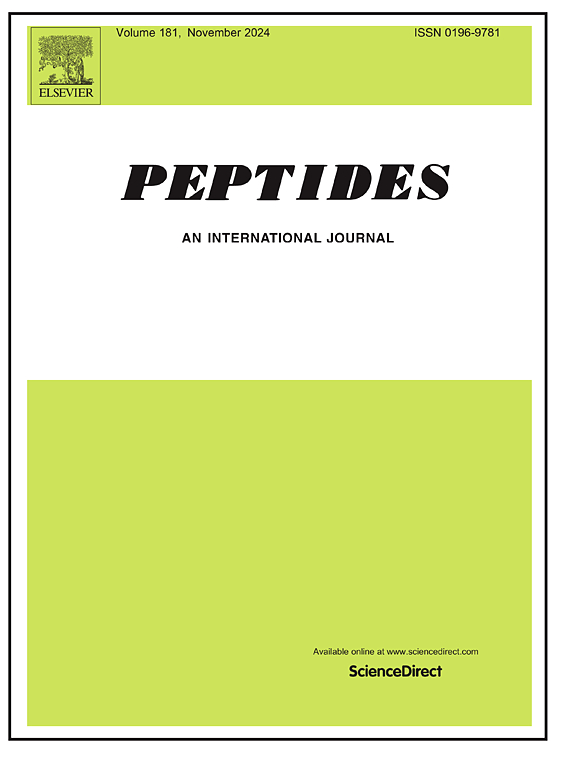Multifunctional incretin peptides in therapies for type 2 diabetes, obesity and associated co-morbidities
IF 2.9
4区 医学
Q3 BIOCHEMISTRY & MOLECULAR BIOLOGY
引用次数: 0
Abstract
Recent studies with peptide-based incretin therapies have focussed mainly on the glucagon-like peptide-1 (GLP-1) receptor agonist semaglutide and the dual agonist tirzepatide that engages receptors for GLP-1 and glucose-dependent insulinotropic polypeptide (GIP). Randomised clinical trials and ‘real-world’ studies have confirmed the marked glucose-lowering and weight-lowering efficacy of these agents across diverse populations. These include different ethnic groups, young and elderly individuals with and without diabetes and/or overweight or obesity. Recent studies have also confirmed protections against the development and progression of cardiovascular and renal diseases that are additive to the benefits conferred by improved control of blood glucose and body weight. Emerging evidence suggests that incretin therapies could additionally ameliorate fatty liver disease, chronic inflammation, sleep apnea and possibly degenerative bone disorders and cognitive decline. New incretin-based peptide therapies in development include a long-acting glucagon receptor agonist (LY3324954), dual GLP-1/glucagon receptor agonists (survodutide, pemvidutide, mazdutide, G49), triple GLP-1/GIP/glucagon receptor agonists (retatrutide, efocipegtrutide), a combination of semaglutide with the amylin analogue cagrilintide (CagriSema), a unimolecular GLP-1/amylin receptor dual agonist (amycretin), and a GIP receptor antibody with GLP-1 receptor agonism (MariTide). The creation of multi-targeting incretin-based synthetic peptides provides opportunities for improved management of type 2 diabetes and obesity as well as new therapeutic approaches to an expanding list of associated co-morbidities. The aim of the review is to acquaint the reader with developments in the field from 2023 to the present (February 2025).
多功能肠促胰岛素肽在治疗2型糖尿病、肥胖及相关合并症中的应用
最近关于以肽为基础的肠促胰岛素治疗的研究主要集中在胰高血糖素样肽-1 (GLP-1)受体激动剂semaglutide和双重激动剂tizepatide,它们结合GLP-1和葡萄糖依赖性胰岛素性多肽(GIP)受体。随机临床试验和“现实世界”研究已经证实,这些药物在不同人群中具有显著的降糖和减肥功效。这些人包括不同的种族群体、有或没有糖尿病和/或超重或肥胖的年轻人和老年人。最近的研究还证实,除了改善血糖和体重控制所带来的好处外,还可以预防心血管和肾脏疾病的发生和发展。新出现的证据表明,肠促胰岛素疗法可以额外改善脂肪肝疾病、慢性炎症、睡眠呼吸暂停以及可能的退行性骨疾病和认知能力下降。正在开发的新的基于肠促胰岛素的肽疗法包括长效胰高血糖素受体激动剂(LY3324954),双GLP-1/胰高血糖素受体激动剂(survodutide, pemvidutide, mazdutide, G49),三重GLP-1/GIP/胰高血糖素受体激动剂(利特鲁肽,依福西肽类),半马鲁肽与胰高血糖素类似物cagrilintide的组合(CagriSema),单分子GLP-1/胰高血糖素受体双激动剂(amycretin),以及具有GLP-1受体激动剂的GIP受体抗体(MariTide)。基于多靶点肠促胰岛素的合成肽的创造为改善2型糖尿病和肥胖的管理提供了机会,并为扩大相关合并症提供了新的治疗方法。回顾的目的是让读者熟悉2023年到现在(2025年2月)该领域的发展。
本文章由计算机程序翻译,如有差异,请以英文原文为准。
求助全文
约1分钟内获得全文
求助全文
来源期刊

Peptides
医学-生化与分子生物学
CiteScore
6.40
自引率
6.70%
发文量
130
审稿时长
28 days
期刊介绍:
Peptides is an international journal presenting original contributions on the biochemistry, physiology and pharmacology of biological active peptides, as well as their functions that relate to gastroenterology, endocrinology, and behavioral effects.
Peptides emphasizes all aspects of high profile peptide research in mammals and non-mammalian vertebrates. Special consideration can be given to plants and invertebrates. Submission of articles with clinical relevance is particularly encouraged.
 求助内容:
求助内容: 应助结果提醒方式:
应助结果提醒方式:


